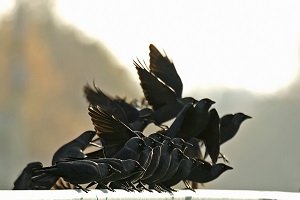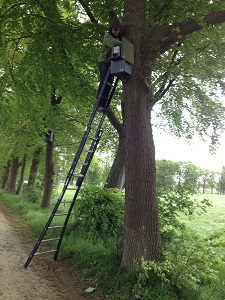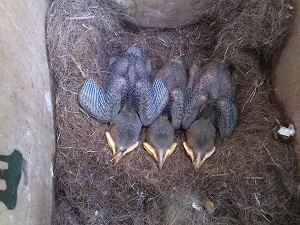Large family shortens lives of jackdaw parents

Jackdaws that raise lots of chicks age three times faster than jackdaws with small broods, behavioural biologist Jelle Boonekamp concludes. Until now there has been no proof for the theory that reproductive effort speeds up ageing. The chicks from the large broods are also less well done by – their telomeres shorten at a quicker rate than those of chicks from small broods. According to Boonekamp, telomere length is a good predictor of survival in young animals. He was awarded a PhD for his research by the University of Groningen on 11 April 2014.
Boonekamp conducted his research on a population of jackdaws, Corvus monedula, to the south of Groningen. University of Groningen behavioural biologists have been following and manipulating this group since 1996, thus enabling slow processes such as ageing to be studied as well. Data from some birds has even been collected for thirteen years in a row.
Brood size
Boonekamp changed the size of jackdaw broods by hand over five years, thus creating two groups within the population – a group of animals that cared for enlarged broods every year (usually four to five chicks) and a group of parents that raised fewer young than planned (usually two to three chicks).
Shorter life
Large families turned out to have a significant impact on the ageing process of the jackdaws. Boonekamp: ‘On average, the jackdaws that raised enlarged broods had a 34% shorter lifespan than the jackdaws that raised fewer chicks. Death among the jackdaws with enlarged broods increased three times faster with age than in the other group. This is remarkable, because before this researchers had been unable to find any effect of brood size on survival.’
Shortened telomeres
The parents were not the only ones to pay the price of lots of descendants. The chicks from the enlarged nests also did less well than the chicks from smaller broods. Boonekamp measured the length of the telomeres of the young jackdaws on the fifth and the thirtieth day after hatching to check ageing. Telomeres are the protected ends of chromosomes, comparable to the aglets at the end of shoelaces.
Oxidative damage
Boonekamp: ‘Telomeres become shorter due to oxidative damage, caused among other things by stress. The telomeres of chicks in the enlarged nests turned out to become shorter much faster than those of chicks from the smaller nests. In turn, this shortening predicted the survival chances of the chicks to adulthood – swiftly shortening telomeres meant a lower chance of survival. We already knew that poor upbringing circumstances had a negative effect on the fitness of an individual, and telomere shortening can possibly explain this.’
In humans
The biologist also examined the way humans age in his research. ‘In humans, too, telomere length is an indicator of the chances of survival. However, my research shows that the degree to which telomere length can predict survival declines with age. This also applies to other indicators (biomarkers) such as cholesterol, blood pressure and BMI.’
Cogwheels
‘This is because the human body can be regarded as a redundant system, a cogwheel with a lot of teeth. If a few of these teeth break off, as a result of ageing, the cogwheel continues to function well. It will only stop working if a lot of teeth have broken. With worn-out cogwheels, it is not the general state (the number of intact teeth, or telomere length in people) that determines the chances of it stopping working, but rather the chances of the last essential tooth breaking.’
Healthcare
Telomere length and other biomarkers in themselves thus do not appear to be very informative for life expectation; however the speed at which they change could be a much better measure of redundancy and lifespan, states Boonekamp. ‘The paradox is that our healthcare system concentrates on checking biomarkers, in annual Health Checks, without taking into account age-related changes. My data suggest that only measuring these values does not say very much about the remaining lifespan; however, the speed at which these values decline could say much more about the future.’
Curriculum vitae
Jelle Boonekamp (Delft, 1984) studied biology at the University of Groningen. He conducted his research, partially funded by an NWO Vici grant, within the department of Behavioural Biology of the Centre for Behaviour and Neurosciences (CBN) of the University of Groningen. Boonekamp is now a postdoc researcher with this group. Boonekamp will be awarded a PhD in Mathematics and Natural Sciences and was supervised by Prof. S. Verhulst. The title of his thesis is Telomeres and life histories – All’s well that ends well?
Note for the press
- Some of Jelle Boonekamp’s findings have been published in the journal Ecology Letters: ‘Reproductive effort accelerates actuarial senescence in wild birds: an experimental study’, DOI: 10.1111/ele.12263, http://onlinelibrary.wiley.com/doi/10.1111/ele.12263/abstract
- For more information: Jelle Boonekamp


| Last modified: | 14 September 2021 1.42 p.m. |
More news
-
18 April 2024
Ward Romeijnders appointed as Professor of Optimization under Uncertainty
The Faculty of Economics and Business is pleased to announce that Ward Romeijnders has been appointed as Professor of Optimization under Uncertainty. The chair is situated within the Department of Operations.
-
18 April 2024
PET-scan expert Jan Pruim benoemd tot Officier in Orde van Oranje Nassau
Hoogleraar medische beeldvorming Jan Pruim is bij zijn afscheid van het UMCG benoemd tot Officier in de Orde van Oranje Nassau. De koninklijke versierselen werden hem op woensdag 17 april uitgereikt door burgemeester Koen Schuiling van de gemeente...
-
16 April 2024
UG signs Barcelona Declaration on Open Research Information
In a significant stride toward advancing responsible research assessment and open science, the University of Groningen has officially signed the Barcelona Declaration on Open Research Information.
